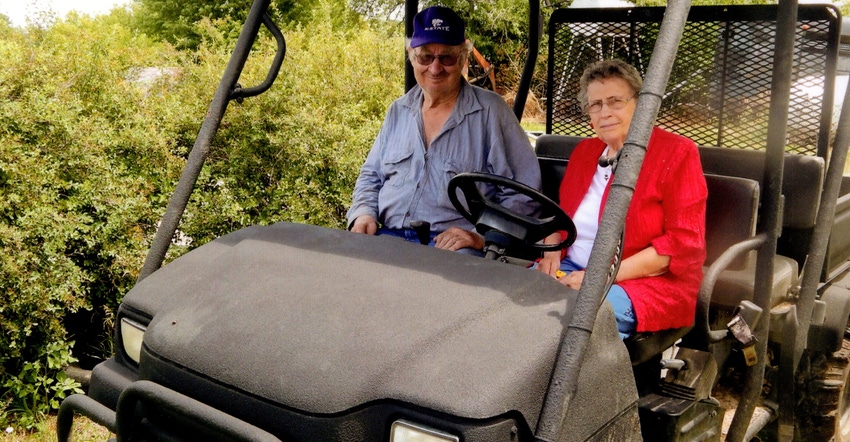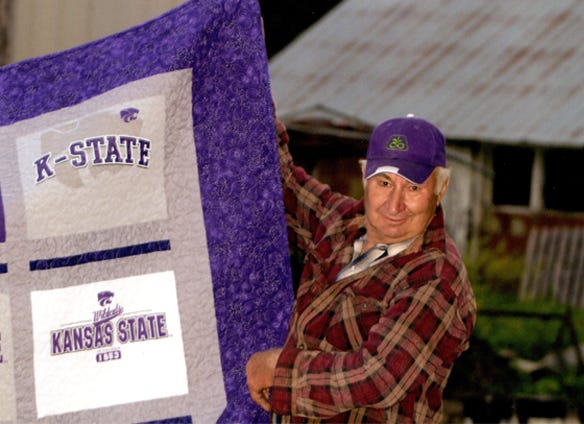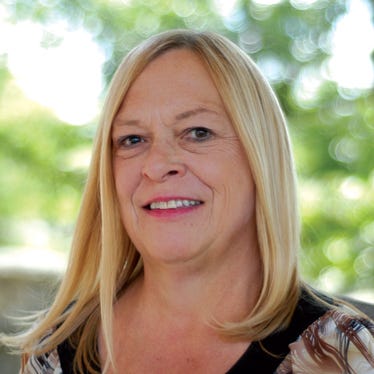
Gary and Delores Rieck started no-till farming way back in 1967 when, as Gary puts it, “no-till wasn’t even a word yet.” His operation has been completely no-till since 1992, and he is still actively engaged in both growing crops and running stocker calves at the age of 80.
“I buy 300-pound calves in August and sell them in August of the following year,” Gary says. “I’ve sold the cattle out of the pasture to buyers since I started 35 years ago, and I plan to continue.”
Conservation has been a mainstay of the Riecks’ operation, such as building waterways and terraces on all land they’ve purchased; grid sampling for fertilizer and lime applications; and spraying pastures to keep them weed-free. The farm has two shelter belts that are 40 to 50 years old.
The Riecks received the Goodyear Soil Conservation award for Osage County in the early 1980s.
About 10 years ago, they installed water outlets behind pond dams and fenced the ponds to keep cattle out. They were following the recommendations of Herschel George, their Marais des Cygnes watershed specialist with Kansas State University and Extension.
“We try to live by a simple principle,” Gary says. “Respect the land; leave it better than when we got it.”
Lifelong farmer
Gary grew up on a farm in Osage County and knew from childhood that he wanted to be a farmer. During high school, he had his own flock of sheep, which numbered 40 ewes. He decided to attend Kansas State University because he wanted to study agriculture.
He graduated with a bachelor’s degree in animal husbandry and agronomy in 1961. During college, he was selected to be a member of the K-State livestock judging team and says he feels fortunate to have had Don Good as his judging coach.
“He told us to always call a spade a spade and have reasons to defend it,” Gary says. “He taught us to always have a reason for your decisions and never give up.”
After college, he spent 6 months in basic training for the U.S. Army and remained a member of the Army Reserve, going to work in October of 1961 as a hog buyer for Swift and Co. in Kansas City. He left that job in April of 1962 and bought 25 gilts. He returned to the farm and worked for his dad for room and board as he built up a hog business over the next three years before he and Delores were married in 1965. The young couple rented 160 acres of crop land and had a hog herd of 60 sows. Soon after, he bought his first parcel of land and built a farrowing house and a finishing house.
“I started out with hogs because I didn’t have much money and it didn’t take much investment,” Gary says. “We spent our first New Year’s Eve together in the farrowing house.”
Gary is active in civic work and ag leadership. He was president of the Kansas Young Farmers in 1968 and has served on the local co-op board of directors, the school board in Burlingame and as a director for southeast Kansas Extension. He is a member the Lions Club and the Burlingame Chamber of Commerce.
He remains a member of the K-State Alumni organization and is an avid K-State supporter, watching football and basketball games on television.
Education, family and quilting
Delores grew up near Walton in Harvey County. She graduated with a bachelor’s degree in business education from Emporia State University. She started a teaching career at Burlingame High School in 1960 but continued her education, earning a master’s degree four years later while continuing to teach.
When their son, George, was born, Delores elected to leave teaching and care for him and his little sister, Gwen, who came along two years later. When the children were older, she returned to college to earn a degree in computer science and returned to a teaching career at Osage City Middle School in Osage City. She taught computer science and did the school’s statistical work for state accreditation.
When her children started college, she taught night classes at Allen County Community College to help put them through K-State.
She, too, has been active in the community, serving on the fair board for several years and coaching Little League Baseball when George was a player. She has served as the Federated Church Treasurer for a number of years and currently helps with the video and computer setup for the church. She was a superintendent of the Open Class Arts and Crafts for the Osage County Fair.
After she retired from teaching school, Delores turned her passion for quilting in a post-retirement career. She started teaching quality classes on the local and state level, presenting classes across the state on quilting. She now has a quilting business and makes quilts for numerous customers. Her favorite is making T-shirts into quilts.
 QUILTING PASSION: Gary Rieck shows off the T-shirt quilt his wife, Delores, made for him in celebration of the 50th anniversary of his graduation from K-State.
QUILTING PASSION: Gary Rieck shows off the T-shirt quilt his wife, Delores, made for him in celebration of the 50th anniversary of his graduation from K-State.

Gary says the top lesson he has learned after 65 consecutive years of harvesting crops is that if you love what you can do, you can overcome anything life throws your way.
Both of their children are involved in agriculture-related careers.
George has three degrees from K-State, a bachelor’s in agronomy, a bachelor’s in civil engineering and a master’s in civil engineering. He and a fellow K-State graduate wrote a program for GPS crop mapping. George does statistical analysis for the program located in Des Moines, Iowa. He and his wife have two boys, the oldest of which has expressed a wish to attend K-State and study architecture.
Gwen also is a K-State grad with a degree in elementary education. She taught for six years. She and her husband, Josh Hoy, live on a 7,000-acre ranch in the Flint Hills. They have an agri-tourism program with the ranch, offering lodging, meals, cattle drives and horseback riding. They have a daughter, Josie, who is 15.
About the Author(s)
You May Also Like






